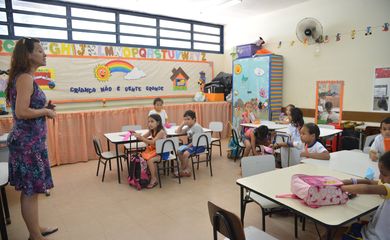Number of children working in Brazil dropped


Minister Tereza Campello attends the weekly program "Bom dia, Ministro", from TV Brasil

The number of children and youth—from 5 to 17 years old—under child labor's condition in the country has dropped more than 43% in ten years. In 2004, the number surpassed 5 million. While in 2014, according to the Ministry of Social Development and Fight against Hunger, 2.8 million children and youth were reported under such condition. In addition to the drop in numbers, Tereza Campello, head of the ministry, pointed out today (Jan. 29) the profile change of child labor.
In an interview for the TV program Bom dia, Ministro, from TV Brasil (an EBC broadcaster), the minister noted that the problem traditionally involved children who were not studying and families with very low income. Currently, child labor happens mostly among those over 14 who attend school, and belong to families earning a monthly income above the minimum wage per person.
"Brazil set a new world benchmark for combating child labor, showing that it is possible to [implement] policies aimed at reducing child labor. Children above 14 years are now working in cities; they go to school, and very often work with their own family," she said.
Campello says the challenge now is to regulate young people's work. She noted that before 13 years old, they are prohibited to work by the Federal Constitution. However, between 14 and 15 years, they are allowed to participate in apprenticeship programs, as long as the youth continues at school. From the age of 16, they are allowed to work under a formal contract, but they cannot work at night hours, or engage in hazardous or unhealthy work.
The minister pointed out the importance to file complaints against child labor's conditions, particularly cases of irregular housework. She reported that this is the most difficult condition to detect, since the victim is "hidden" from society, in the employer's residence.
Translated by Amarílis Anchieta
Fonte: Number of children working in Brazil dropped


